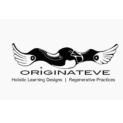Certificate of Mentorship of Holistic & Regenerative Learning Designs
A 12-month* intensive course highly customized to the candidate’s geography, culture and background. This course is designed to prepare a learner to work with Originateve Living Classrooms at any school offering holistic pedagogy or andragogy. The material covered will highlight the relevant discourse from traditional, alternative, cyclical and eclectic education models and journey through creatively contributing personal voice and reflection to a community of life–long learners. Students will engage in practical study and student mentoring at a branch offering Originateve curriculum and will be overseen by a Certified Mentor Guide. In addition, students will access and engage in an on-line campus for theory and written assignments as well as engage with the global network of mentors and mentees continuously building a repository of data within the field of holistic education.
Course Outline
The Certificate Program is divided into three stages culminating with 60 Semester Credit Hours (800 practical hours) of study and practical application within a holistic environment and indigenously alive community that offers a wide range of learner types and ages with which to draw experience. The course is divided into the 3 rungs that build upon each other: Cipactli, Ehecatl and Calli.
CIPACTLI – Introduction to Holistic Education and Cultural Regeneration
260 hours (20 SCH)
Course overview: Imix is an intense, interactive, and practical study wherein the recipient will gain substantial general knowledge and understanding of the methodologies and vocabulary regarding Holistic Educational Environments, activities of Cultural and Ecological Revitalization and Sustainability, integration of the cognitive, affective and spiritual domains in the learning environment, and an introduction to Indigenous, Traditional and Alternative Literacy with a deep focus on narrative, folklore and myth as cultural seeds and mnemonic devices.
1. | The Game |
2. | Repairing the Education of the Past |
3. | Sacred Space |
4. | Composition of a Learning Environment |
5. | Recent History of Newtonian Psychology |
6. | Language and Dreams |
7. | Grief and Praise |
Ehecatl – Intermediate Holistic Education and Cultural Regeneration
(Prerequisite IMIX) – 260 hours (20 SCH)
Ik builds on concepts sown in Imix and develops a broader understanding of the interconnection of Literacy and Language, Community, Culture, Ecology, and Spiritual Insight. During this time the intern will take on more independence with regard to facilitation of projects, be those educational or constructive. The holistic learning environment is not always a classroom. Indeed, it is all places and preparation of those spaces for intentional learning is key. The intern will focus on peripheral learning and prepared learning environments in this stage as well as cyclical, reflective learning models. Study of story/ myth/ folklore expands to sagas, is developed into the art of storytelling and integration of stories into spontaneous learning moments.
1. | To be a Plant |
2. | Social/ Cultural Comparison |
3. | Emotional and Spiritual Quotient |
4. | Narratives of the Anterior, Exterior and Interior |
5. | Cyclical and Holistic Learning |
6. | Multi-Lingual Holism |
7. | Gift for the Divine |
CALLI – Advanced Holistic Education and Cultural Regeneration
(Prerequisite IK)- 260 hours (20 SCH)
The final third of the program synthesizes the concepts of indigenous wisdom and indigenous land management (and the intentional regeneration and revitalization of such knowledge across cultures that may be unpopular with the oppressed) with permaculture design that integrates community development programs, and holistic cross-disciplinary approaches to educational facilitation with an emphasis on emotional and spiritual intelligence, assessments and individual longitudinal education plans, kairos and improvisational based facilitation techniques, and mentor/ learner relationship development. With Akbal comes greater responsibility and a commitment to the toil of the process of all things expected in the process of mentoring and constantly, consistently learning a multitude of skills simultaneously to demonstrate lifelong learning behaviors. Layers of wisdom regarding ancient narrative are demonstrated from the fable to the level of epic myths. Time-bending is effectively improved and reflections concerning the mentor, learner and community are evident and articulated.
1. | Alternative Currencies |
2. | We Are All Animals |
3. | Toys From Trash |
4. | Function and Design |
5. | Intending Intense Intention |
6. | Early Childhood through Second Teeth |
7. | Sacred Geometry
General Comments on Assignments and Course Requirements
Policy on Original Work
Heads up!
Basic Rules of Thumb
Acknowledgements
Long life, Honey in the Heart, No Evil, Thirteen Thank yous. |
